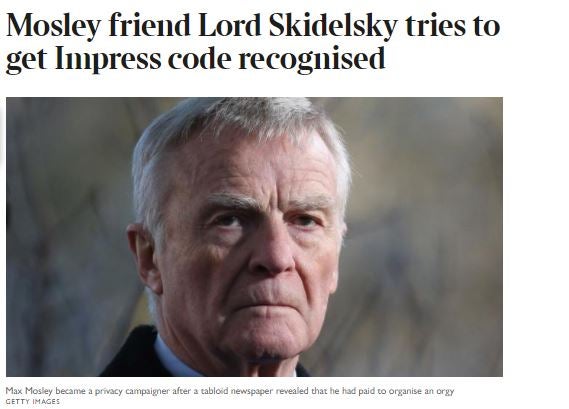
Max Mosley says an incorrect report in The Times stating that his son “committed suicide”has caused his family “great distress”.
And – in a letter to Press Gazette – he has accused the title of engaging in “fake news” with a report that Lord Skidelsy saw Mosley’s father Oswald (the late UK fascist leader) as “his hero”. The Times was reporting on the crossbench peer’s bid to get the code of press regulator Impress added to the Data Protection Bill.
Royal Charter-backed press regulator Impress is entirely funded by Mosley’s family charity.
Alexander Mosley died of a drug overdose in 2009.
Mosley said in his letter to Press Gazette: “On 3 November, the Times published a news story under the headline ‘Mosley friend tries to get Impress code recognised‘. It had learned that a group of peers were moving amendments to the Data Protection Bill to prevent membership of IPSO providing exemptions under a new law. The peers reasoned that as IPSO was a private organisation with no independent oversight, the code it uses should not confer the same privileges as those of Ofcom or the BBC.
“This enraged the Times. As one of IPSO’s owners, it set out to undermine the peers concerned. It discovered that one of them, Lord Skidelsky, was a friend of mine (hence the headline) and tried to discredit him by saying he had described my father, Oswald Mosley, as ‘his hero’. For good measure, it added my son had committed suicide and that I blamed this on tabloid revelations about me.
“Neither claim was true. A few seconds on the internet shows that my son did not commit suicide and nowhere in Skidelsky’s 1975 biography (or anywhere else) did he ever describe my father as ‘his hero’.
“Both points are seriously damaging. The Lord Skidelsky claim calls into question his status as an eminent historian, while the Times must have known its suicide allegation would cause great distress to me and my immediate family.”
Mosley said he thought it was unlikely The Times had not checked its facts and said: “More probably, the Times management decided to reinforce its support for IPSO with two falsehoods, a classic example of fake news.
“On 8 November, the Times had to admit that the story of my son’s suicide was completely untrue and two days later had to do the same with the Skidelsky allegation. Both apologies appeared in a small and obscure corrections column the Times keeps at the bottom of its letters page.
“The Times knows very well that a prominent news story under the headline ‘Mosley friend tries to get Impress code recognised’ will be widely read while very few trouble to read corrections columns unless they themselves expect a correction.
“The overwhelming inference has to be that the falsehoods were deployed as part of a campaign to discredit anyone opposed to newspapers like the Times ‘marking their own homework’ as Sir Brian Leveson put it. Making use of fake news in support of a thoroughly dishonest attempt to prevent truly independent press regulation is a sad epitaph for what was once the newspaper of record.”
The Times responded to Mosley’s claims saying: “We reject any suggestion that deliberate errors were made in our reporting. There were two regrettable mistakes that we corrected promptly. We ran corrections in our established column on the Letters page – one of the best-read and most important pages in the paper – and we apologised in both cases.”
Email pged@pressgazette.co.uk to point out mistakes, provide story tips or send in a letter for publication on our "Letters Page" blog
